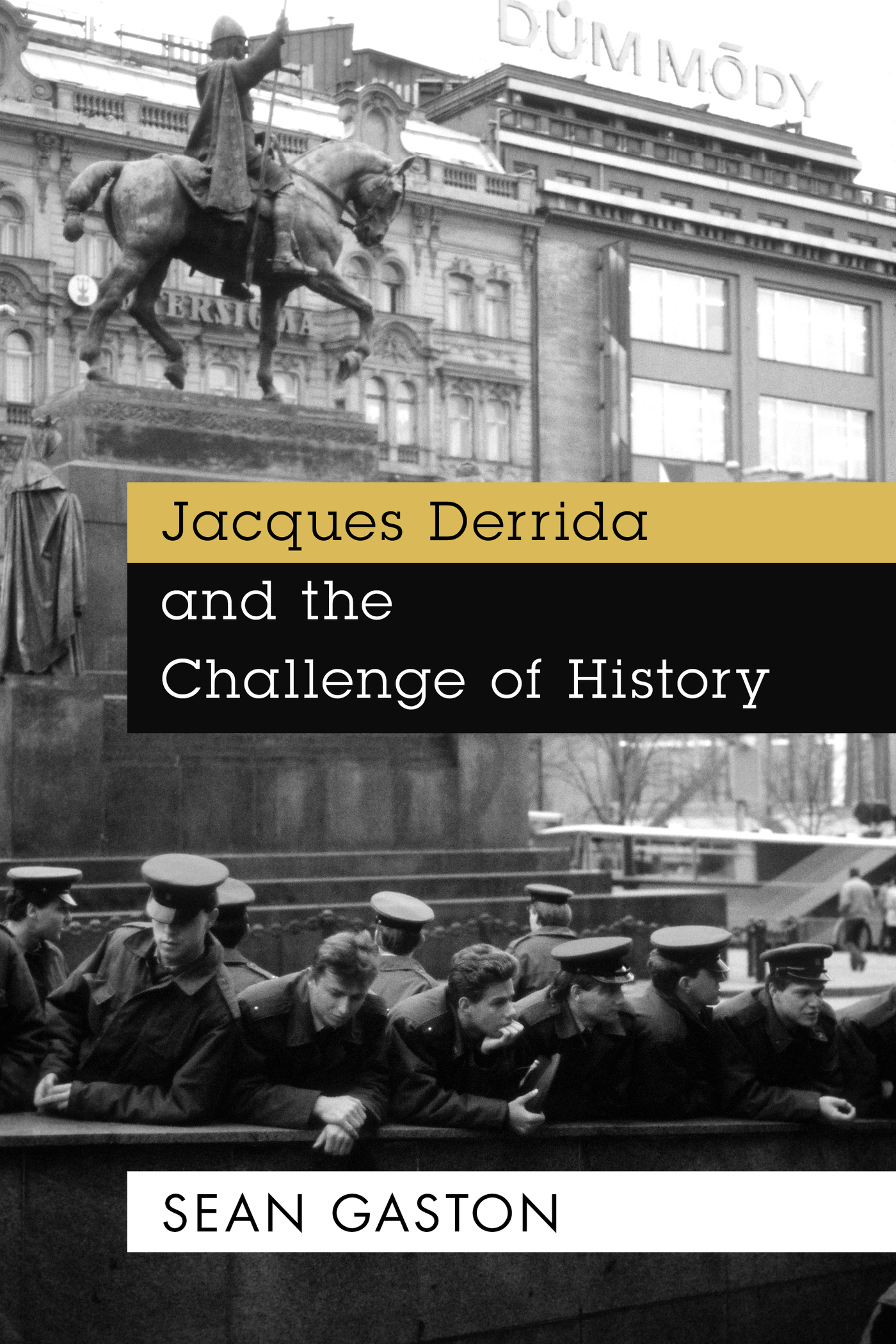Jacques Derrida and
the Challenge of History
Jacques Derrida and
the Challenge of History
Sean Gaston

London New York
Published by Rowman & Littlefield International, Ltd.
6 Tinworth Street, London SE11 5AL
www.rowmaninternational.com
Rowman & Littlefield International, Ltd. is an affiliate of
Rowman & Littlefield
4501 Forbes Boulevard, Suite 200, Lanham, Maryland 20706, USA
With additional offices in Boulder, New York, Toronto (Canada), and London (UK)
www.rowman.com
Copyright 2019 by Sean Gaston
All rights reserved. No part of this book may be reproduced in any form or by any electronic or mechanical means, including information storage and retrieval systems, without written permission from the publisher, except by a reviewer who may quote passages in a review.
British Library Cataloguing in Publication Information
A catalogue record for this book is available from the British Library
ISBN: HB 978-1-78661-080-5
ISBN: PB 978-1-78661-081-2
Library of Congress Cataloging-in-Publication Data
Names: Gaston, Sean, author.
Title: Jacques Derrida and the challenge of history / Sean Gaston.
Description: Lanham : Rowman & Littlefield International, 2019. | Includes bibliographical references and index.
Identifiers: LCCN 2018038028 (print) | LCCN 2018053702 (ebook) | ISBN 9781786610829 (Electronic) | ISBN 9781786610805 (cloth : alk. paper) | ISBN 9781786610812 (pbk. : alk. paper)
Subjects: LCSH: Derrida, Jacques. | HistoryPhilosophy.
Classification: LCC B2430.D484 (ebook) | LCC B2430.D484 G383 2019 (print) | DDC 194dc23
LC record available at https://lccn.loc.gov/2018038028
 TM The paper used in this publication meets the minimum requirements of American National Standard for Information Sciences Permanence of Paper for Printed Library Materials, ANSI/NISO Z39.48-1992.
TM The paper used in this publication meets the minimum requirements of American National Standard for Information Sciences Permanence of Paper for Printed Library Materials, ANSI/NISO Z39.48-1992.
Printed in the United States of America
Preface
The Problem of History
I
The hypothesis of this book is that Jacques Derridas (19302004) work can be treated as the basis for a philosophy of history and a deconstructive historiography. The possibility of seeing Derrida not as a philosopher of language but as a philosopher of history has become more apparent with the publication in 2013 of Derridas 19641965 seminar, Heidegger: The Question of Being and History. Delivered at the cole normale suprieure in the critical period in which Derrida was first articulating his critique both of the history of metaphysics in philosophy and of the proclaimed end of metaphysics as found in the mid 1960s in linguistics, structuralism and structural linguistics, the seminar treats history as a problem that encounters the impasse of renewed models of historicism and ahistoricism. Derrida complicates this impasse by thinking about history in terms of la trace and diffrance; both profound attempts to disrupt the metaphysical assertion of essence as a form of the sensible or the intelligible and to displace the traditional definition and separation of time and space. Thanks to the publication of the 19641965 lectures, we now know that the problem of history was at the heart of Derridas work in the mid 1960s prior to the publication of his best-known work, Of Grammatology (1967).
One of the implications of a heightened focus on history in Derridas writings over fifty years is that his so-called political turn in the early 1990s, which saw the publication of a wide range of material on the law, ethics and politics, can also be treated as marking an ongoing engagement with the challenge of history. For example, in this period Derrida also focused on the problem of Friedrich Nietzsches (18441900) understanding of political history. However, if there is the possibility of a deconstructive historiography, it is found not only in the many and varied works in the early 1990s in which Derrida talks directly about the concept of history; it is also found in his growing interest from at least the mid 1970s in a range of different historical problems that include: the dating of a written work; the relation between autobiography, biography and historical testimony; the differences between fictional narratives, memoirs and historical events; and the political and institutional contexts that shape the history of philosophy and, especially, the philosophy of the first half of the twentieth century.
The second part of this book will therefore be focusing on Derridas work on context, memory and narrative from the mid 1970s to the mid 1990s as the basis for a possible deconstructive historiography. The first part of the book examines Derridas treatment of historicism and historicity in the 1960s before turning to what I would describe as Derridas formulation of a philosophy of history in the early 1970s.
Chapter 1 addresses Derridas persistent criticism of reductive forms of historicism. From his earliest work in the 1950s on phenomenology, Derrida engaged with Edmund Husserls (18591938) sustained challenge to a philosophy determined by an empirical, historical, cultural and relativist context. Husserl argues that philosophy can only aspire to a science if it can account for trans-historical objects and trans-historical objectivities. Derrida always treated Husserls notion of historicity as a history of idealized trans-historical objectivities as an example of philosophy assuming a privileged vantage point over history. But he also retained Husserls critique of a historicism that appeared to give history an authority founded on a self-evident and determining empiricism.
From his readings of Husserl, confronted with one side advocating a seamless history of the same and the other side insisting on a history without the possibility of the same exceeding a determined, particular context, Derrida argued in the 1960s that the possibility of the same as the same also registers an unavoidable relation to the other. A necessary repetition of the same cannot avoid some kind of alteration or difference. The same may still be the same but as a repetition it cannot be identical. Derridas early critiques of historicism and ahistoricism also evoke structures in which the possibility of totality announces the possibility of what exceeds any totality. In Derridas thought, there is therefore a quasi-transcendence that counteracts a determined historicism without privileging a classical ahistoricism. In my view, this can be described as a philosophy of history because these quasi-transcendental gestures also register the historicity of the historical event and its narrative.
Chapter 2 focuses on Derridas recently published 19641965 seminar on Martin Heideggers (18891976) treatment of historicity (Geschichtlichkeit) in Being and Time (1927). The political and philosophical contexts for Derridas first seminar at the cole normale suprieure in 1964 also need to be placed in the context of recent Heidegger studies after the publication in 2014 of the Black Notebooks (19311941) with their explicit link between anti-Semitism and historicity. In the context of the mid 1960s, in the seminar Derrida both addresses Heideggers links with National Socialism and treats the concept of historicity in
Next page
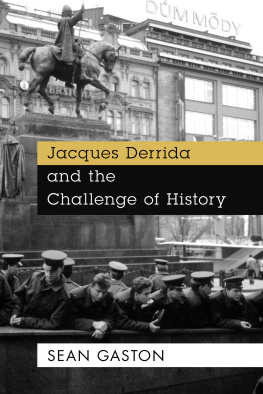

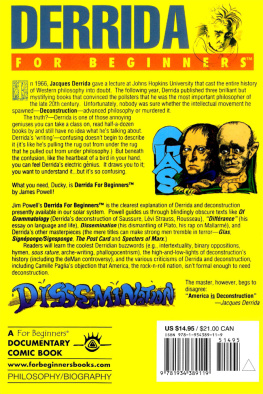
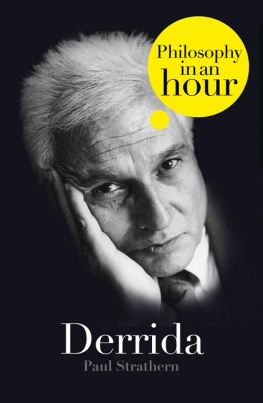
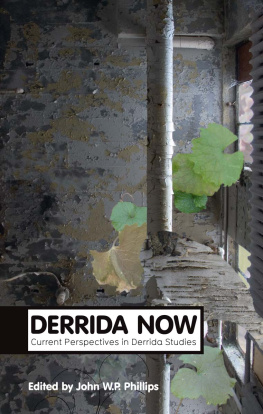
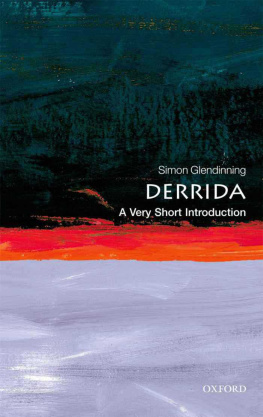
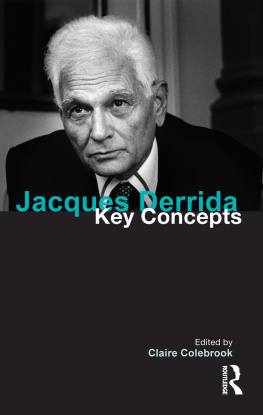
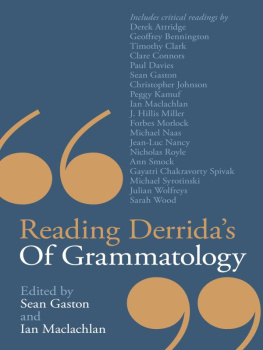

 TM The paper used in this publication meets the minimum requirements of American National Standard for Information Sciences Permanence of Paper for Printed Library Materials, ANSI/NISO Z39.48-1992.
TM The paper used in this publication meets the minimum requirements of American National Standard for Information Sciences Permanence of Paper for Printed Library Materials, ANSI/NISO Z39.48-1992.